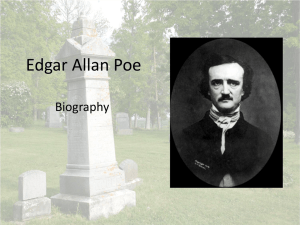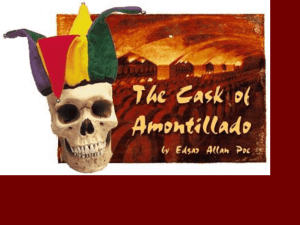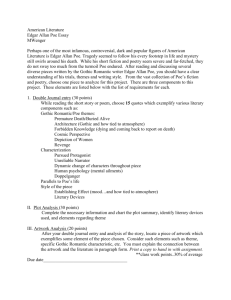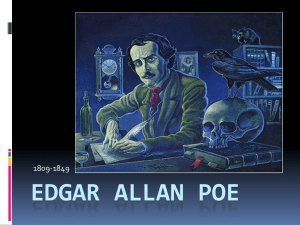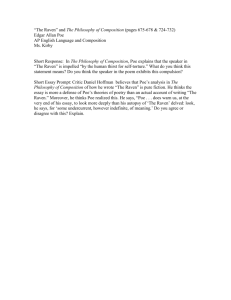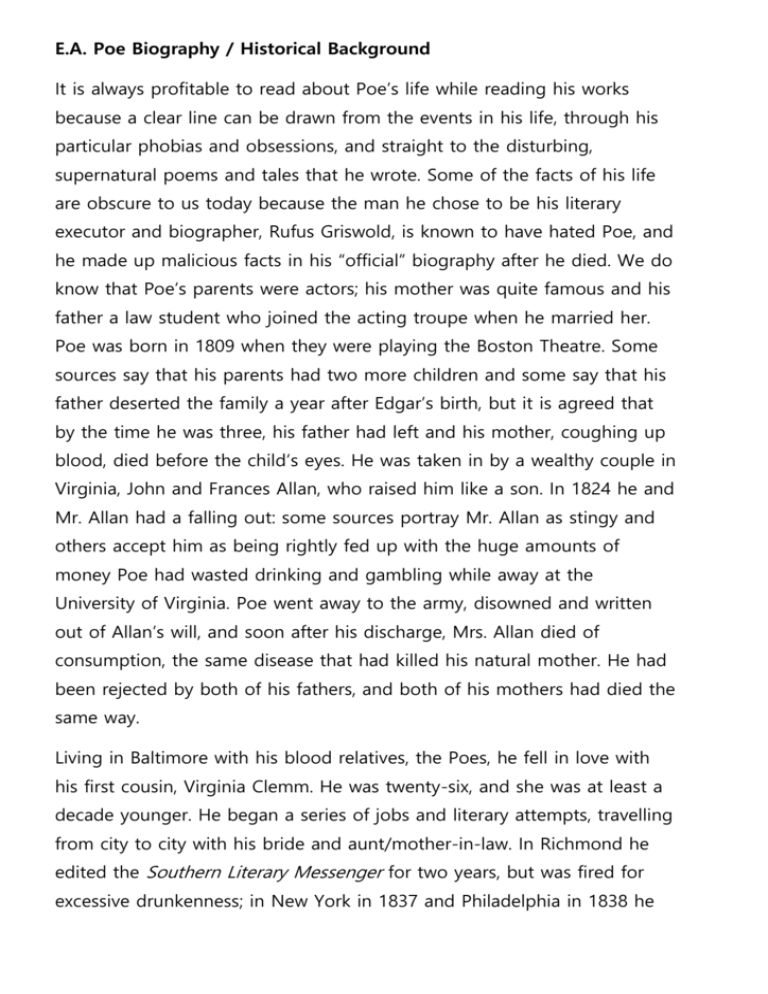
E.A. Poe Biography / Historical Background
It is always profitable to read about Poe’s life while reading his works
because a clear line can be drawn from the events in his life, through his
particular phobias and obsessions, and straight to the disturbing,
supernatural poems and tales that he wrote. Some of the facts of his life
are obscure to us today because the man he chose to be his literary
executor and biographer, Rufus Griswold, is known to have hated Poe, and
he made up malicious facts in his “official” biography after he died. We do
know that Poe’s parents were actors; his mother was quite famous and his
father a law student who joined the acting troupe when he married her.
Poe was born in 1809 when they were playing the Boston Theatre. Some
sources say that his parents had two more children and some say that his
father deserted the family a year after Edgar’s birth, but it is agreed that
by the time he was three, his father had left and his mother, coughing up
blood, died before the child’s eyes. He was taken in by a wealthy couple in
Virginia, John and Frances Allan, who raised him like a son. In 1824 he and
Mr. Allan had a falling out: some sources portray Mr. Allan as stingy and
others accept him as being rightly fed up with the huge amounts of
money Poe had wasted drinking and gambling while away at the
University of Virginia. Poe went away to the army, disowned and written
out of Allan’s will, and soon after his discharge, Mrs. Allan died of
consumption, the same disease that had killed his natural mother. He had
been rejected by both of his fathers, and both of his mothers had died the
same way.
Living in Baltimore with his blood relatives, the Poes, he fell in love with
his first cousin, Virginia Clemm. He was twenty-six, and she was at least a
decade younger. He began a series of jobs and literary attempts, travelling
from city to city with his bride and aunt/mother-in-law. In Richmond he
edited the Southern Literary Messenger for two years, but was fired for
excessive drunkenness; in New York in 1837 and Philadelphia in 1838 he
sold some fiction to make ends meet. In 1839 he co-edited Burton’s
Gentlemen’s Magazine, was fired for drinking, then was hired for Graham’s
by the same publisher who had just fired him. In 1842 Virginia suffered a
burst blood vessel in her throat, and was incapacitated for five years
before she died. Although it was not the same disease that had killed his
mother and stepmother, the similarity was still there. Poe continued to get
and lose jobs. In 1845, publication of “The Raven” in The American Review
made him an instant sensation, and, with his profits from speaking
engagements and his next book, he was able to buy the magazine that he
worked for, The Broadway Journal. True to Poe’s luck, it went bankrupt the
next year. Virginia’s death was two years after “The Raven” was published,
but that didn’t stop some critics from guessing that she was the model for
Lenore. After she died, Poe quit drinking but continued moving from place
to place, possibly affected by a brain lesion. He became paranoid and
worried that assassins were following him. On Election Day, October 3rd,
1849, he was found in a gutter in Baltimore, muttering deliriously.
Different accounts say that he was drunk, on drugs, or had suffered a
stroke. One of the most charming versions of his death comes from the
American Catholic Quarterly Review of October 1891: “Some political
agents who were on the lookout for voters perceived him, and in a spirit
of thorough ruffianism seized and drugged the unfortunate poet. They
then made him record his vote in several different polling booths, treating
him with such violence that he died from its effects . . .”
Source: Poetry for Students, ©2013 Gale Cengage. All Rights Reserved. Full copyright.


